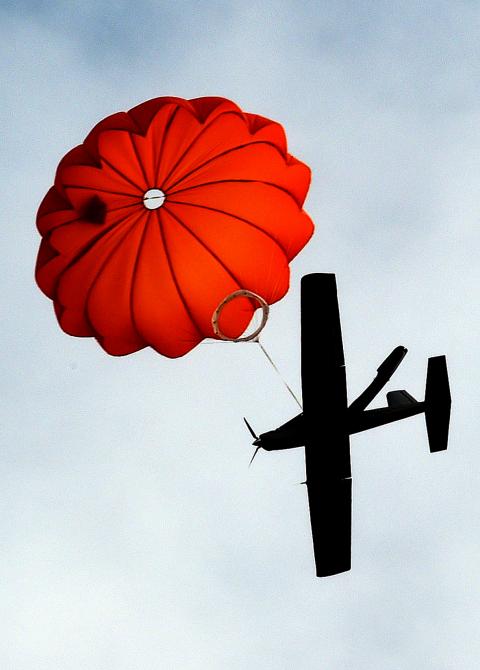The nation’s defense and air reconnaissance capabilities have been significantly enhanced with unmanned aerial vehicles (UAVs) and other cutting-edge systems and devices, which were unveiled yesterday by the Chungshan Institute of Science & Technology (CSIST).
The demonstration of remote-controlled aircraft and new pilot-training simulators took place at the institute’s Aeronautical Systems Research Division in Greater Taichung.
A small, 5kg battery-powered drone, named “Cardinal,” can be launched by hand and has a one-hour flight time and a range of 8km, division officials said. It is piloted by remote control by an operator via wireless link at a mobile station, they said.

Photo: Chien Jung-fong, Taipei Times
Division director Ma Wan-june (馬萬鈞) said the small aircraft has the advantages of portability, ease of operation and the capability to gather aerial intelligence.
“Taiwan’s indigenous UAV’s have bolstered the range and capacity of the military’s air reconnaissance and surveillance missions, and also assist the navy and Coast Guard Administration to defend our marine territories,” he said.
“The aircraft can also be used for disaster relief and rescue missions; aerial photography for assessing environmental changes; monitoring of forest and mountain regions; and management of agriculture and water resources,” Ma said.
The Cardinal yesterday was launched by a handler who flew it over a field as it provided a continuous feed of aerial imaging signals, GPS information and other data to the computers at its ground control station.
After popping open a parachute, the drone touched down for retrieval and reuse.
“It is outfitted with an electro-optical and infrared imaging system, which can rotate 360o for wide-angle coverage. It can also carry out missions at night with its infrared bands,” Ma said.
A bigger drone called the “Albatross” weighs 317kg, has an 8m wingspan, a flight time of 10 hours and a 150km range, he said.
The Albatross can also carry heavier payloads, he said.
He said all of the drone fleet models were developed by the division, with the production and integration of components coming from more than 20 Taiwanese companies, generating NT$1.34 billion (US$42.95 million) in derived business revenues.
Officials at yesterday’s demonstration would not confirm whether the drones are able to carry missiles and other weapons.
They said a technical service team would be established shortly to allow government agencies access to the drone fleet for various uses.
The demonstration also included a flight simulator for training pilots, combat simulators for soldiers and the TFE-1042 turbofan engine, which can be converted into an electrical generator.
The TFE-1042 was developed to power the Indigenous Defense Fighter (IDF) jets and is now targeted for the “green energy” sector, as the engine can burn methane gas from biodegradable garbage and animal waste.
Ma said the institute has had a lot of inquiries from around the world for the engine, while estimating potential derived revenue to reach about NT$40 billion in the coming years.

CHAOS: Iranians took to the streets playing celebratory music after reports of Khamenei’s death on Saturday, while mourners also gathered in Tehran yesterday Iranian Supreme Leader Ayatollah Ali Khamenei was killed in a major attack on Iran launched by Israel and the US, throwing the future of the Islamic republic into doubt and raising the risk of regional instability. Iranian state television and the state-run IRNA news agency announced the 86-year-old’s death early yesterday. US President Donald Trump said it gave Iranians their “greatest chance” to “take back” their country. The announcements came after a joint US and Israeli aerial bombardment that targeted Iranian military and governmental sites. Trump said the “heavy and pinpoint bombing” would continue through the week or as long

TRUST: The KMT said it respected the US’ timing and considerations, and hoped it would continue to honor its commitments to helping Taiwan bolster its defenses and deterrence US President Donald Trump is delaying a multibillion-dollar arms sale to Taiwan to ensure his visit to Beijing is successful, a New York Times report said. The weapons sales package has stalled in the US Department of State, the report said, citing US officials it did not identify. The White House has told agencies not to push forward ahead of Trump’s meeting with Chinese President Xi Jinping (習近平), it said. The two last month held a phone call to discuss trade and geopolitical flashpoints ahead of the summit. Xi raised the Taiwan issue and urged the US to handle arms sales to

State-run CPC Corp, Taiwan (CPC, 台灣中油) yesterday said that it had confirmed on Saturday night with its liquefied natural gas (LNG) and crude oil suppliers that shipments are proceeding as scheduled and that domestic supplies remain unaffected. The CPC yesterday announced the gasoline and diesel prices will rise by NT$0.2 and NT$0.4 per liter, respectively, starting Monday, citing Middle East tensions and blizzards in the eastern United States. CPC also iterated it has been reducing the proportion of crude oil imports from the Middle East and diversifying its supply sources in the past few years in response to geopolitical risks, expanding

An Emirates flight from Dubai arrived at Taiwan Taoyuan International Airport yesterday afternoon, the first service of the airline since the US and Israel launched strikes against Iran on Saturday. Flight EK366 took off from the United Arab Emirates (UAE) at 3:51am yesterday and landed at 4:02pm before taxiing to the airport’s D6 gate at Terminal 2 at 4:08pm, data from the airport and FlightAware, a global flight tracking site, showed. Of the 501 passengers on the flight, 275 were Taiwanese, including 96 group tour travelers, the data showed. Tourism Administration Deputy Director-General Huang He-ting (黃荷婷) greeted Taiwanese passengers at the airport and